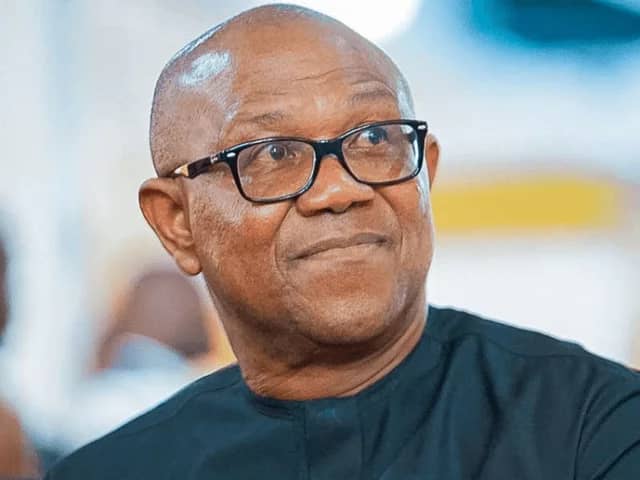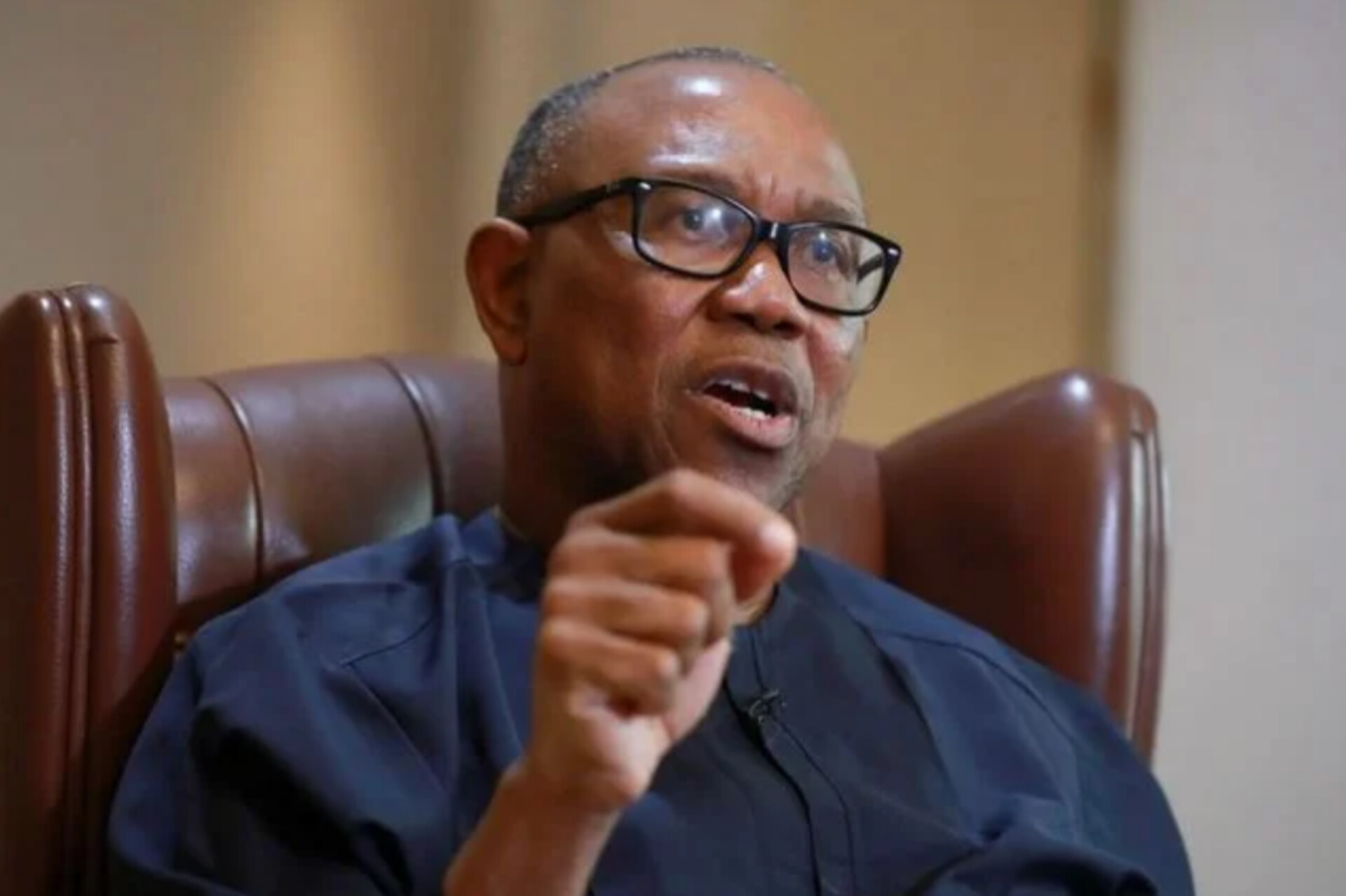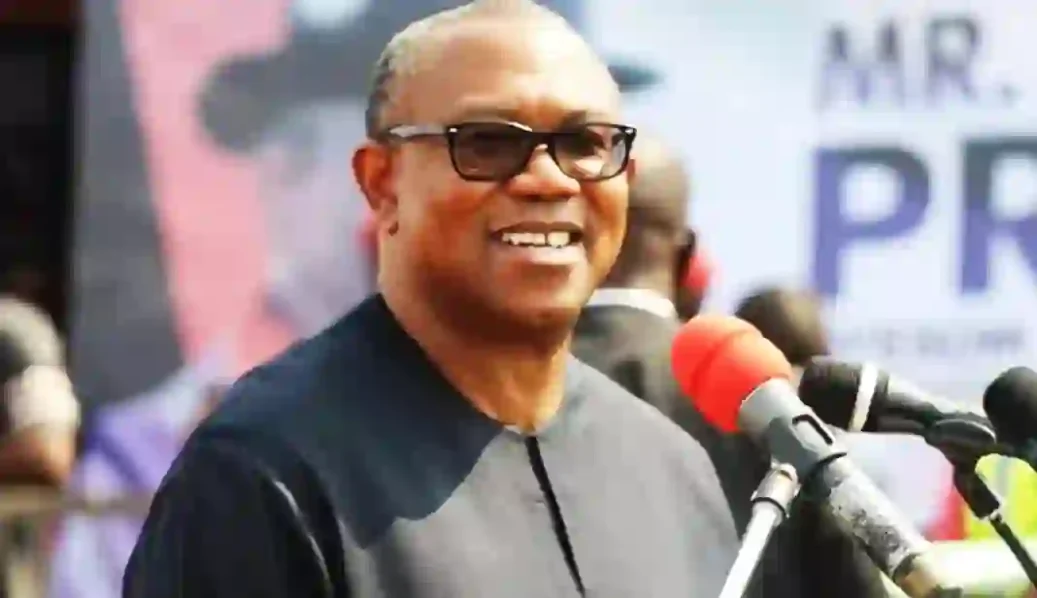Politics
Obi Demands Bold Reforms: Challenges Tinubu to Prioritize Domestic Crisis Over Foreign Diplomacy

In a searing New Year’s address, Peter Obi, former Anambra State Governor and Labour Party’s 2023 presidential candidate, has issued a clarion call for urgent reforms, challenging President Bola Ahmed Tinubu to abandon ceremonial leadership and confront Nigeria’s mounting crises with decisive action.
Obi’s message portrayed Nigeria’s situation as a “national emergency,” marked by economic collapse, deepening insecurity, and widespread hunger. He painted a grim picture of rising poverty, shrinking GDP, and the erosion of public trust in governance, warning that failure to act could push the country to the brink of irreversible decline.
Obi cited alarming statistics, revealing that over 100 million Nigerians now live in extreme poverty, while 150 million grapple with multidimensional hardship. Once Africa’s largest economy, Nigeria has slipped to fourth place, with GDP shrinking to $200 billion and per capita income plummeting to $1,000.
Highlighting the 2024 Global Hunger Index, which ranked Nigeria 110th out of 127 countries, Obi underscored the inadequacy of the newly proposed N70,000 minimum wage, arguing it cannot even buy a bag of rice.
Obi did not mince words regarding Tinubu’s leadership, criticizing the President’s 180 days of foreign trips within his first 580 days in office. He accused Tinubu of prioritizing international engagements over urgent domestic issues and called for an immediate shift in focus to address Nigeria’s crumbling infrastructure, healthcare system, and education sector.
“Mr. President, Nigeria is bleeding,” Obi stated. “We need leadership rooted at home, addressing our realities—not in distant capitals.”
Obi urged Tinubu to conduct on-the-ground assessments of insecurity, displacement, and poverty by visiting IDP camps and dilapidated schools. He further challenged the President to undergo medical checkups in local hospitals to spotlight Nigeria’s healthcare crisis and inspire confidence in local institutions.
Proposing a roadmap to national recovery, Obi outlined key reforms to include Cutting the Cost of Governance: Redirecting resources to critical areas like security, education, and poverty alleviation, Fighting Corruption by Strengthening procurement transparency and recovering stolen funds to restore fiscal discipline and Smart Borrowing to ensure future debts are tied to regenerative investments rather than consumption.
Other proposed reforms by Obi included Institutional Reforms to strengthen electoral systems and rebuilding public trust in democracy and National Unity and Inclusivity to promote empathy by visiting conflict zones, military bases, and regions in crisis.
Borrowing from Martin Luther King Jr., Obi declared, “We are confronted with the fierce urgency of now. This is no time for apathy or complacency.”
He called on Tinubu to embrace reforms that inspire confidence, drive development, and restore hope for Nigerians.
While many Nigerians welcomed Obi’s remarks as a patriotic call to action, critics questioned whether his message was a veiled attempt to position himself for future elections.
Regardless of interpretation, Obi’s demands resonate with millions of Nigerians exhausted by economic hardship and insecurity. As 2025 unfolds, the spotlight remains on Tinubu’s administration to either deliver the bold reforms Obi advocates—or risk deepening public disillusionment.
Politics
“Where Did $3.23B Go?” Peter Obi Slams Mismanagement of Power Funds Amid Another Grid Failure

Former presidential candidate Peter Obi has raised serious concerns over Nigeria’s persistent electricity woes despite borrowing a staggering $3.23 billion in the last four years to address the sector’s challenges.
Speaking after reports of a power outage on Saturday, Obi lamented the recurring grid collapses that have left millions of Nigerians in darkness, disrupted businesses, and crippled critical infrastructure. Although the Transmission Company of Nigeria (TCN) dismissed claims of a nationwide collapse, attributing the incident to two tripped transmission lines affecting parts of Lagos, Obi remains unconvinced.
The Labour Party leader described the power sector’s failings as a “recurring decimal,” highlighting that the national grid collapsed approximately 12 times in 2024 alone. “The untold setback and hardship it brought on households and businesses was immeasurable,” Obi said, questioning why Nigeria still struggles to produce just 4,500 megawatts of power after years of borrowing and investment.
“Instead of making significant progress, we’re witnessing recurrent failures. One wonders where all the funds borrowed for the power sector have gone,” he stated.
Obi linked the crisis to widespread corruption and a lack of commitment by leaders, urging the government to prioritize genuine development in 2025. He emphasized that without stable electricity, the nation’s economy, particularly households and small businesses, will continue to suffer.
This latest critique comes as Nigerians grapple with the realities of an unreliable power supply despite years of promises and investments in the energy sector. Obi’s call for transparency and accountability strikes a chord with many citizens who question why the lights are still out after billions of dollars have been spent.
Politics
For better Nigeria, Obi says he is ready to pay the supreme prize

The former presidential candidate of the Labour Party, Peter Obi has boldly declared his willingness to pay the supreme price for the betterment of Nigeria, signaling his unwavering commitment to the country’s progress despite facing relentless opposition.
Obi, who has faced intimidation, personal attacks, and sabotage since his foray into politics, stated that he remains resolute in pushing for the reforms that ordinary Nigerians desperately need, even if it comes at the cost of his own life.
In a deeply personal statement, Obi spoke to reporters following his New Year address to the nation. “It is extremely difficult to be in opposition in this country.
Everything is against you,” he lamented. “People don’t want to see you or associate with you because they fear government backlash. My businesses and personal life have been attacked, but I’ve made up my mind. If this is the end, so be it.”
Obi described Nigeria’s political environment as hostile to those who challenge the status quo, with efforts to silence dissent at all levels. Despite these harsh realities, Obi emphasized that the country’s future depends on courageous leadership willing to make personal sacrifices for the common good. “None of us is going to live forever. So we must build a better society for our children. And to build this, some of us will take the risk. That is part of what Dele and others are going through. Not just him, but everyone – even at the local and state levels.”
In his address, Obi turned his focus to Nigeria’s dire economic state, calling for urgent action to tackle inflation, food insecurity, and the country’s failing education and healthcare systems. He stressed that governance must focus on the tangible needs of the people, not just political power games. “Governance is not about what you say; it is about what people feel,” Obi stated, urging the government to prioritize the well-being of Nigerians over foreign trips and extravagant spending.
Obi also pointed to the deepening poverty and unemployment, noting his visit to an Internally Displaced Persons (IDP) camp where he witnessed the heartbreaking sight of children eager to attend school but unable to do so due to their circumstances. “People are dying because they can’t afford basic necessities,” Obi stated with a heavy heart. “I saw 1,500 kids yesterday who are not in school. What are we doing about it?”
Criticizing the government’s tax policies, Obi argued that it is illogical to tax an impoverished populace and struggling industries. “You cannot tax people living in extreme poverty or factories that have shut down,” Obi said, stressing that a productive economy is the foundation for generating revenue. “When people are gainfully employed, then you can talk about generating revenue. What we need now is to reflate the country and make it productive,” he added.
In closing, Obi reiterated his call for unity among all political forces, urging Nigerians who truly care about the nation’s future to collaborate in rebuilding the country. “We need everyone who means well to come together and rebuild this country,” he stated.
His final remarks were a solemn pledge to continue fighting for the welfare of the Nigerian people. “None of us will live forever. But we must build a nation where our children can thrive. If I have to pay the supreme price for that, so be it,” Obi declared.
Peter Obi’s speech highlighted his commitment to advocating for the voiceless and challenging the status quo. His resolve to make personal sacrifices, even in the face of adversity, sets a powerful tone for the year ahead as Nigerians continue to look for solutions to the nation’s most pressing issues.
Politics
Presidency Fires Back at Peter Obi’s Dire New Year Predictions

In a fiery exchange of words, President Tinubu’s Special Adviser for Information and Strategy, Bayo Onanuga, has accused Labour Party’s Peter Obi of painting Nigeria’s future in bleak colors to score political points.
While Nigerians welcomed 2025 with optimism, Obi’s New Year message highlighted worsening poverty and insecurity, sparking sharp criticism from the presidency.
Onanuga dismissed Obi’s remarks as “misleading” and labeled him a “prophet of doom,” arguing that economic and political indicators point to recovery, not decline. However, Obi insisted that over 100 million Nigerians remain trapped in poverty, with the nation’s fortunes in reverse.
Onanuga accused Obi of name-calling and a campaign of calumny against Tinubu’s government, adding his New Year’s message where he claimed Nigeria’s political, economic, and security situation is worsening daily, was misleading.
On Thursday, Obi claimed that the government had not done enough to address the country’s “worsening” economic, political, and security challenges for nearly two years.
Obi said Nigerians were losing hope and insisted that Nigeria remained one of the poverty capitals of the world, with over 100 million people living in extreme poverty and more than 150 million in multidimensional poverty.
According to the Labour Party chieftain, Nigeria’s challenges are visibly worsening with its fortunes in clear reverse, pointing out that current indices are indications of the country’s decline.
But Onanuga maintained that Obi’s comment is geared toward scoring cheap political points.
“Obi’s New Year message, in which he claimed that our dear country’s political, economic, and security situation is worsening daily, is misleading and appears intended to score cheap political points,” Onanuga said.
“This claim, at a time when all indicators show that our country is rebounding in significant measure across all sectors, casts Obi, squarely, as Nigeria’s leading doomsayer.”
-

 Crime1 year ago
Crime1 year agoPolice nabs Killer of Varsity Lecturer in Niger
-

 News12 months ago
News12 months agoFCT-IRS tells socialite Aisha Achimugu not to forget to file her annual returns
-

 Appointment1 year ago
Appointment1 year agoTinubu names El-Rufai, Tope Fasua, others in New appointments
-

 Kogi1 year ago
Kogi1 year agoINEC cancells election in 67 polling units in Ogori-Magongo in Kogi
-

 Kogi1 year ago
Kogi1 year agoEchocho Challenges Tribunal Judgment ordering rerun in 94 polling units
-

 News1 year ago
News1 year agoIPOB: Simon Ekpa gives reason for seperatists clamour for Biafra
-

 Metro10 months ago
Metro10 months ago‘Listing Simon Ekpa among wanted persons by Nigeria military is rascality, intimidation’
-

 News1 year ago
News1 year agoKingmakers of Igu/ Koton-Karfe dare Bello, urge him to reverse deposition of Ohimege-Igu
